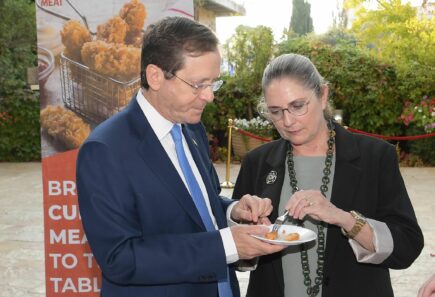
Rational optimism for cultivated meat
Elliot Swartz, Ph.D.Perspectives from the beginning of a long journey

Perspectives from the beginning of a long journey

The Smart Protein Summit is your chance to hear from thought leaders, industry titans, pioneering scientists, and avant-garde entrepreneurs - from India and beyond. Designed to facilitate action, learning, and networking, your world-changing smart protein plans could come to life through the Smart Protein Summit 2021.

Plant-based and cultivated meat cut emissions by up to 92%. In order to meet the Paris Agreement, we must change how meat is made.

Israeli President Isaac Herzog has become the world’s first president to taste cultivated meat, as the country officially embraces alternative proteins as part of its National Climate Strategy ahead of COP26.
Interest in plant-based products is growing, but many consumers still express skepticism about plant protein foods, or simply lack familiarity with the category. Category marketing campaigns to promote plant-based and alt protein products, independent of specific brands, can engender familiarity and showcase recent innovations. Campaigns can emphasize flavor, convenience, familiarity, nutrition, and other positive attributes. Category marketing can help expand existing markets, increase demand, and promote alternative proteins for new markets and use cases.
Many alternative protein companies are interested in exporting their products or ingredients, and this is matched by interest from businesses in many countries eager to import exciting products. But import/export is a complex endeavor with many legal, logistical, and administrative challenges. There are many opportunities for brokers, directories, legal firms, and service providers to facilitate global trade in alternative proteins, including consulting services on regulatory compliance, facilitating introductions to in-country distribution partners, and aggregating listings of government support programs and trade contacts.
There is currently a lack of resources for high school students interested in alternative proteins. Students interested in entering this field would benefit from the creation of summer courses that provide motivated high school students with the theoretical background, hands on experience, and a network of peers to help foster their interest in alternative proteins. The aim of initiating such a program is to encourage students to pursue self-directed learning in this area, thus stimulating growth in the alternative protein community.

GFI joins Representatives Rosa DeLauro (D-CT) and Katherine Clark (D-MA) in celebrating the USDA’s investment in the creation of the National Institute for Cellular Agriculture: the U.S.’ first-ever government supported cultivated protein research center of excellence.

GFI Founder and CEO Bruce Friedrich explores the increased sector alignment around the preferred category name for meat produced through cellular agriculture.
Rep. Julia Brownley and House Agriculture Committee Member Rep. Jim McGovern led a letter signed by 44 of their colleagues asking House Agriculture Committee Chair David Scott to include $200 million for alternative protein research at USDA’s Agricultural Research Service in the budget reconciliation package.